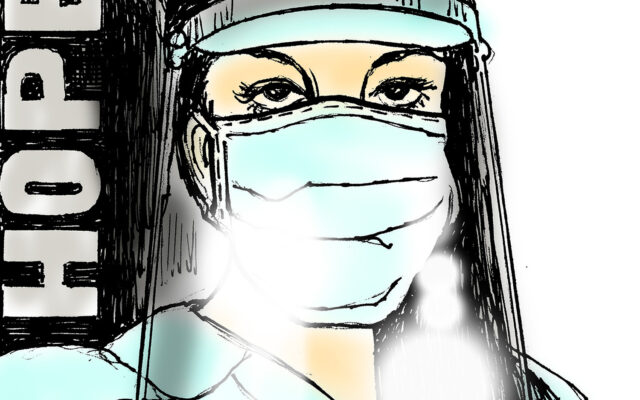
The journey toward hope as a health care worker during the COVID-19 pandemic
By Karl-Heinz Spittler MD
On March 11, 2020, the World Health Organization declared COVID-19 a pandemic. Only a few could have initially predicted the global humbling and the immense scale of suffering and loss of human life that would follow, and how our lives as we knew were upended. Many thought that, at least the developed world, would be able to ward off a full-blown pandemic.
It’s not surprising that many people had a hard time initially understanding the severity of the public health crisis that was growing. The virus was, after all, an intangible force — a haunting, incomprehensible presence, necessitating us to stay away from each other and our loved ones. For some, it was an invisible burden that appeared distant from our seemingly safe neighborhoods, schools and houses of worship, but in reality, it lurked in the most common of places, including our own homes.
However, living in Maine also teaches you respect for mother nature, and so we prepared early on. Like other health care workers around the world, we understood we would have to quickly adapt to this hard, and unprecedented new reality — because we simply had to protect our patients in need, and ourselves.
Striking the fragile balance between keeping our most vulnerable citizens and patients safe and alive, and trying to maintain a sense of normalcy for people with a lower risk profile so they can go on with their pursuit of happiness in life, has been confusing for all of us. But, it has also given us new meaning and appreciation for many of the things we have always taken for granted, like visiting and hugging loved ones, going to a movie or enjoying a meal in a restaurant, or even just going to work and returning safely. Each of these daily routines has had their own varying degrees of risk and a price too steep to afford, and hence not a single day over the last year has been easy for any of us.
The early days of unsettling uncertainty and, at times, panic have settled into fatigue and melancholy along the road to recovery, which has been slower and more heartbreaking than most of us could have ever imagined.
But finally, there is hope, justified and real, to be able to reclaim our lives: the first COVID-19 vaccine arrived at our Northern Light Health doorstep on Dec. 14, 2020.
The pandemic may have brought out the dark side of human nature in some instances, but it has also showed us clearly what the best part of human nature can truly do. It was human ingenuity and worldwide collaboration, which have been marshaled and found a brilliant solution to the first worldwide plague of the 21st century — not just one, but several safe and highly effective vaccines against COVID-19. Vaccines so effective that, according to the latest research, they have proven to prevent almost all hospitalizations and deaths from COVID-19.
We now have our opportunity to experience again what life makes truly worth living — enjoying, and being around each other, our fellow human beings.
Let’s not waste this opportunity — our one “shot” toward bringing normalcy back to our collective lives. If there is one thing we have learned for sure in this last year, it’s the deceptive nature of the coronavirus pandemic to surprise us at every turn, but we have also surprised ourselves with the unbelievable fast, safe and effective vaccine development. Vaccines and rolling up our sleeves together can help us rebuild our lives together. But it is very important that we do not let our guards down now. We can see the light at the end of the tunnel, but we have not emerged from the dark just yet. Only you can help us get there.
After the arduous journey that we all have been on, I kindly ask one thing of you: Please get vaccinated, it is the most important thing anyone can do to help us to end this pandemic.
Karl-Heinz Spittler MD is staff physician anesthesiologist at Northern Light Eastern Maine Medical Center, co-president of Northern Light Medical Group and senior vice president of Northern Light Health.